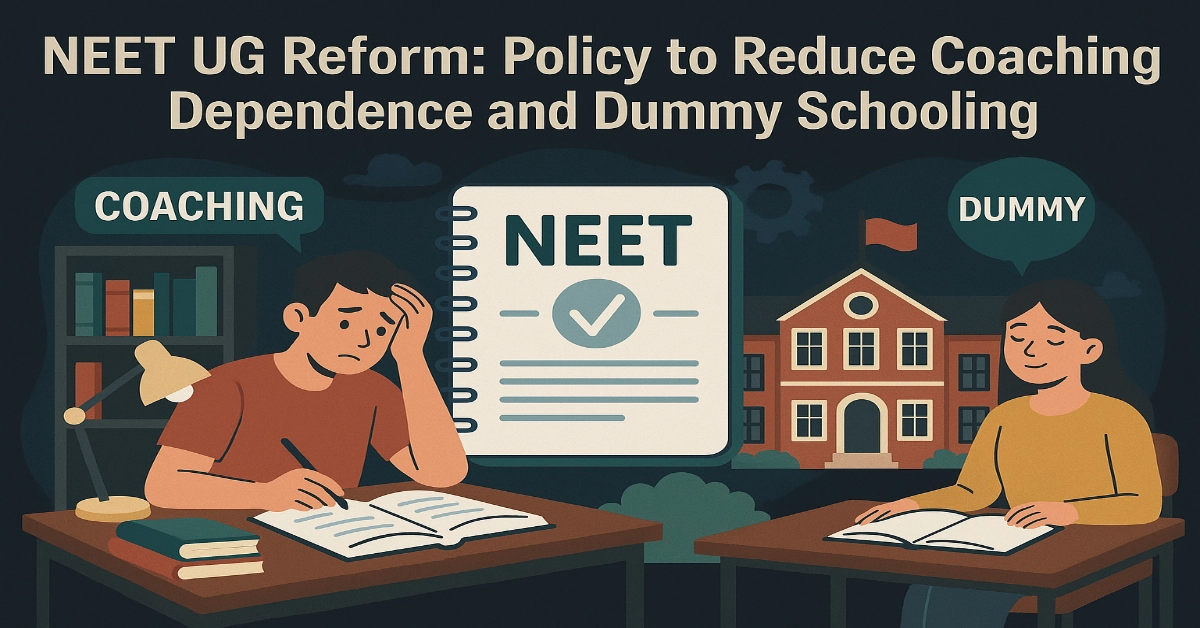NEET UG Reform: The NEET exam is the only route to MBBS admissions in India. In the last couple of decades, students have become increasingly dependent on expensive coaching institutes and have adopted “dummy schooling” practices. They skip regular school classes entirely. This practice is undermining formal education, widening the urban-rural gap, and distorting the personality development of future doctors.
The government, from time to time, tried in failure to bring out a policy to reduce coaching dependence and dummy schooling. But, there seems to be no change. Once again, the government has formed a committee to suggest policy regarding this issue.
Context
The Ministry of Education, Government of India, has formed a 9-member committee to address students’ increasing dependence on coaching institutes. This committee will suggest reforms to reduce coaching dependency by improving the school education system. The panel, headed by Higher Education Secretary Dr. Vinit Joshi, includes representatives from CBSE, NCERT, IIT, NIT, Kendriya Vidyalaya, Navodaya Vidyalaya, and private schools.
Policy Focus: Bring NEET Back to Schools. End Dummy Schooling.
The Terms of Reference
The committee will study reasons behind the growing “dummy schooling culture,” where students skip regular classes to focus solely on coaching. It will also recommend innovations to make school education more logical, analytical, and engaging, reducing the need for external coaching.
A strong policy framework is urgently needed to bring NEET preparation back into the schooling system and reduce the inequity created by high-cost coaching.
Understanding the Issues
Coaching Dependence
- Nearly 85% of NEET aspirants now enrol in private coaching centers.
- Coaching costs ₹2–₹5 lakh/year, unaffordable for rural, tribal, and EWS (Economically Weaker Section) students.
- The gap between rural government school students and urban private school students is widening sharply.
- To know more about the urban vs rural divide in medical education in India, read Becoming a Doctor in India: NEET, Struggles & Realities
Dummy Schooling
- Students register in schools just to appear for board exams, skipping all classes and school activities.
- No exposure to practical labs, sports, arts, moral education, or peer interaction.
- Long-term impact: Poor communication skills, lack of ethics, inability to work in teams, undesirable qualities for future doctors.
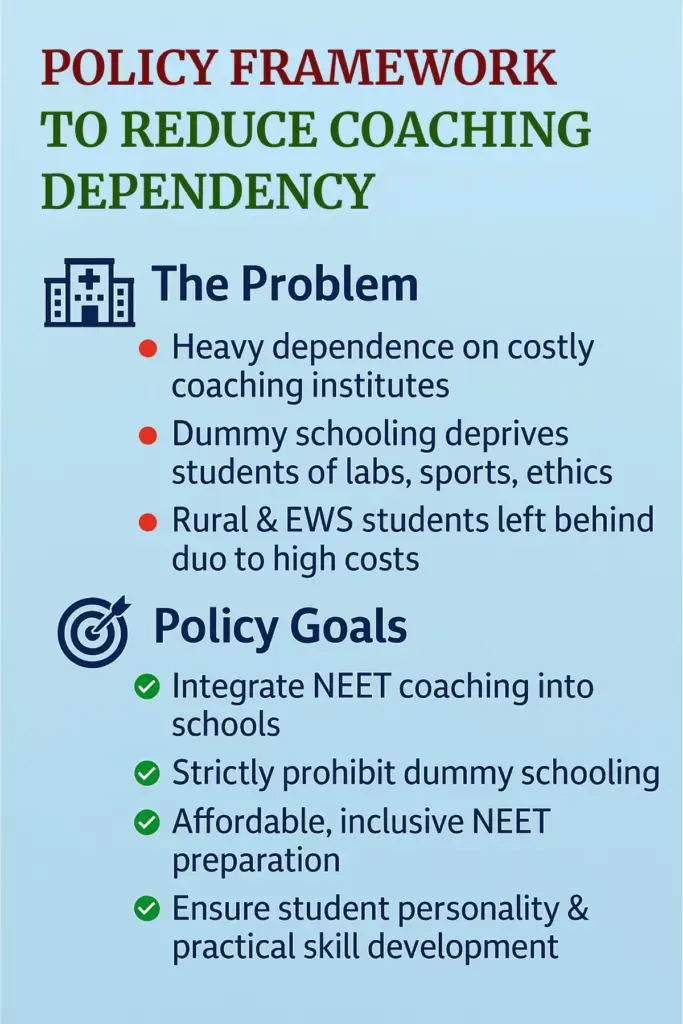
Why Formal Schooling & Practical Classes Matter?
Practical Learning:
Biology, Physics, and Chemistry practicals in school labs are essential to build real scientific understanding, something coaching cannot provide.
Overall Development:
Schools nurture life skills, discipline, leadership, ethics, empathy, and mental well-being, critical for a caring medical professional.
Socialisation & Values:
Interaction with peers, teachers, and participation in co-curricular activities fosters confidence, emotional intelligence, and communication skills.
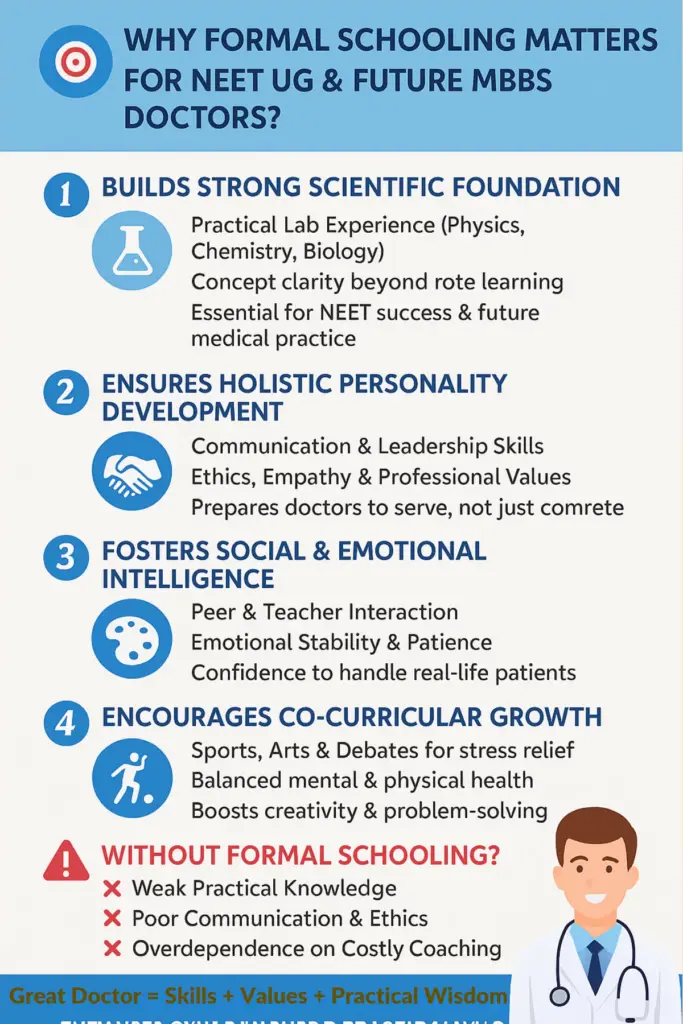
Real-World Problem Solving:
School projects, experiments, and group activities cultivate curiosity and creativity, vital for good doctors who think beyond rote learning.
Cost Barrier for the Poor:
High coaching fees create a deep divide where only urban and financially strong students can afford specialised preparation, leaving rural and poor students behind despite their talent.
Read Also: K Radhakrishnan Committee Report: Major Exam Reforms for NEET from 2026
Key Goals of the Policy Framework
- Bring NEET preparation within formal schooling.
- Prohibit and penalise dummy school practices.
- Make coaching affordable or unnecessary.
- Ensure rural and EWS students are not excluded.
- Promote the development of well-rounded future doctors.
Proposed Policy Measures
Align NEET Syllabus with NCERT Curriculum
- Remove syllabus mismatch between NEET and Class 11–12 curriculum.
- Boards to revise assessments to include NEET-type analytical questions.
Strict Enforcement of Regular Schooling Norms
- Minimum 75% attendance mandatory for board exam eligibility.
- Dummy school operators to face fines, de-affiliation, or legal action.
- Surprise audits by CBSE and State Boards to detect violations.
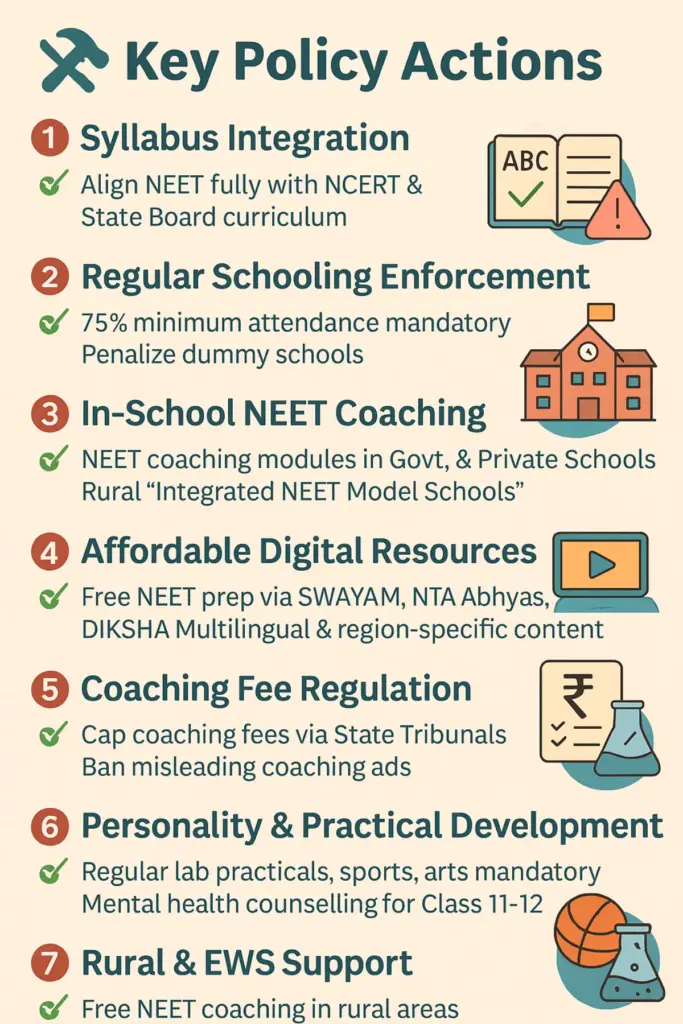
Integration of NEET Coaching in Schools
- Government & private schools to offer in-house NEET preparatory modules.
- Special rural model schools (like Navodaya Vidyalayas) with integrated coaching.
- CBSE and State Boards to introduce “Applied Medical Science” electives.
Affordable Digital NEET Platforms
- Expand SWAYAM, DIKSHA, NTA Abhyas App with regional content.
- State-level free NEET portals with mock tests, video lectures in local languages.
- Free NEET crash courses for rural/EWS government school students.
Coaching Fee Regulation
- State tribunals to cap coaching institute fees.
- Ban on misleading “100% NEET rank guaranteed” advertisements.
- Encourage not-for-profit community NEET coaching centers in villages.
Know Here: Free Coaching and Scholarships to Aspiring Medical Students
Strengthening Practical & Personality Development
- Regular lab classes, science experiments, and biology dissections are made compulsory.
- Mandatory co-curricular participation: debates, sports, social work.
- Mental health counselling & career guidance sessions in schools.
Rural & EWS Special Measures
- Government aid for rural schools to set up NEET-oriented labs.
- Scholarships & free coaching schemes for tribal, rural, and EWS aspirants.
- Faculty exchange programs to ensure quality NEET training reaches remote schools.
Implementation Framework
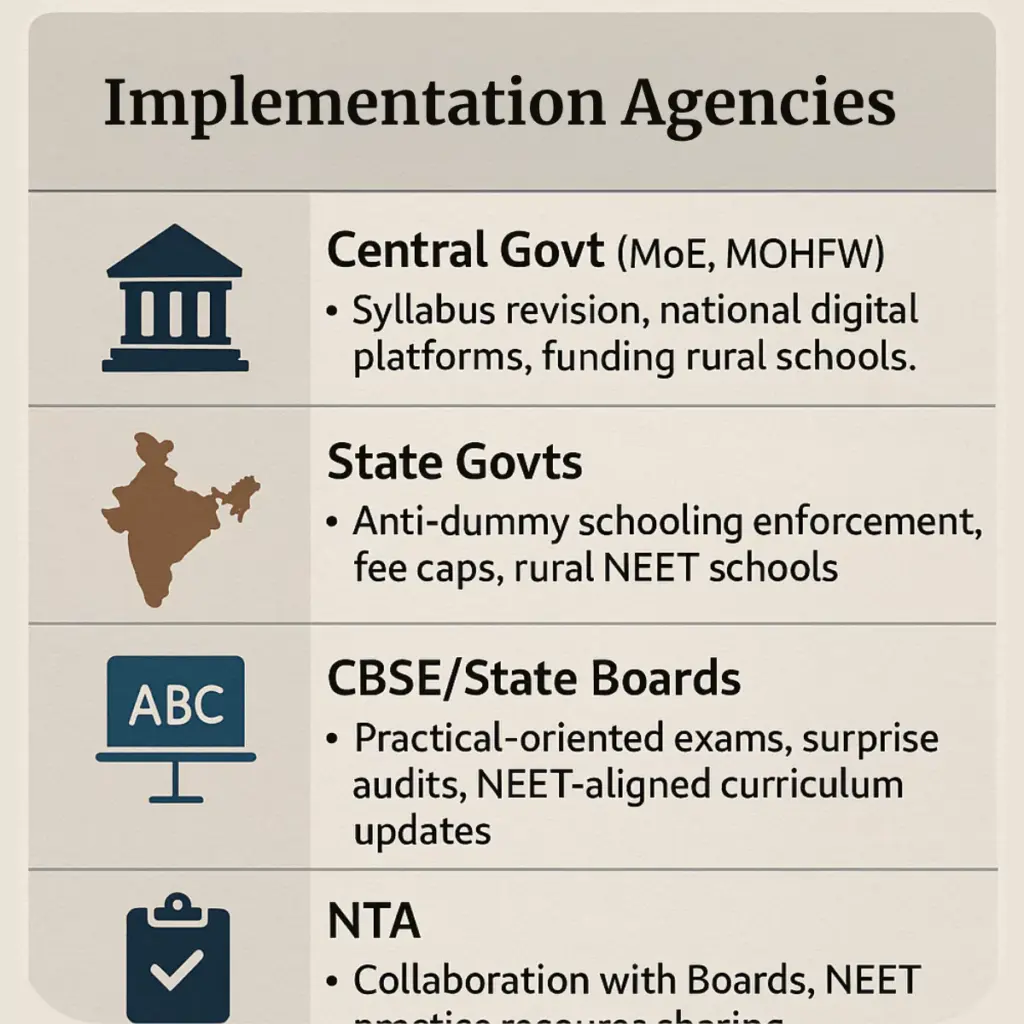
Challenges to Overcome
- Resistance from coaching lobbies and dummy school operators.
- Parents fear that “no coaching = no MBBS seat.”
- Huge demand for training teachers in NEET-level content delivery.
Expected Positive Outcomes
- Reduced urban-rural NEET success gap.
- Less financial burden on poor families.
- Doctors who are better communicators, ethical, empathetic, and not merely rote learners.
- Restored respect and relevance of India’s formal school system.
For India to build a generation of skilful doctors, NEET-UG preparation must move back into schools and away from profit-driven coaching centres. Dummy schooling must end to ensure students develop into complete individuals, not just machine-like competition geeks.
A comprehensive, multi-level policy reform, executed sincerely, is the only way to democratise medical education and fulfil the aspirations of rural, tribal, and economically disadvantaged NEET aspirants

